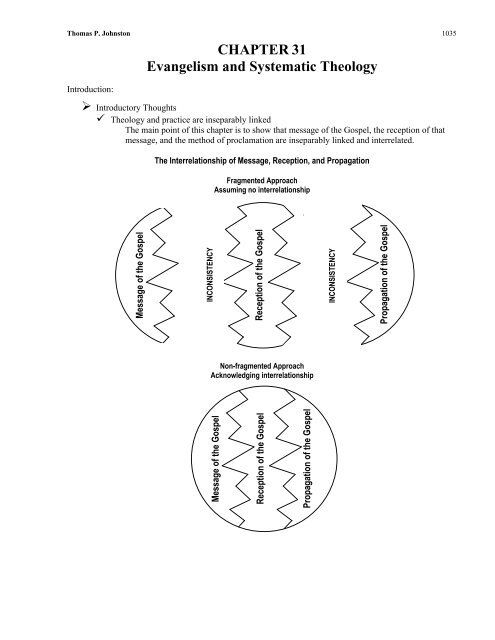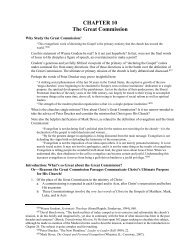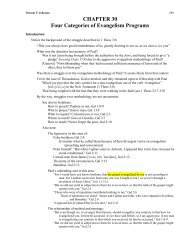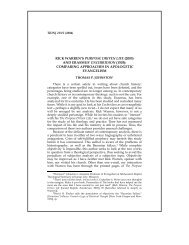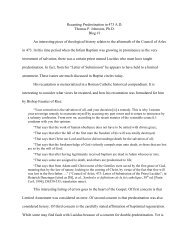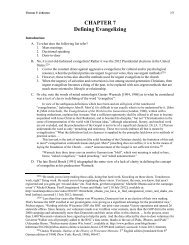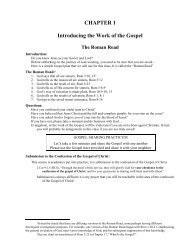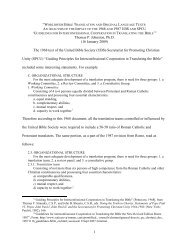Evangelism and Systematic Theology - Evangelism Unlimited
Evangelism and Systematic Theology - Evangelism Unlimited
Evangelism and Systematic Theology - Evangelism Unlimited
You also want an ePaper? Increase the reach of your titles
YUMPU automatically turns print PDFs into web optimized ePapers that Google loves.
Thomas P. Johnston 1035<br />
CHAPTER 31<br />
<strong>Evangelism</strong> <strong>and</strong> <strong>Systematic</strong> <strong>Theology</strong><br />
Introduction:<br />
Introductory Thoughts<br />
<strong>Theology</strong> <strong>and</strong> practice are inseparably linked<br />
The main point of this chapter is to show that message of the Gospel, the reception of that<br />
message, <strong>and</strong> the method of proclamation are inseparably linked <strong>and</strong> interrelated.<br />
Message of the Gospel<br />
The Interrelationship of Message, Reception, <strong>and</strong> Propagation<br />
INCONSISTENCY<br />
Fragmented Approach<br />
Assuming no interrelationship<br />
Non-fragmented Approach<br />
Acknowledging interrelationship<br />
Message of the Gospel<br />
Reception of the Gospel<br />
Reception of the Gospel<br />
Propagation of the Gospel<br />
INCONSISTENCY<br />
Propagation of the Gospel
1036 Evangelizology<br />
Good theology leads to good practice<br />
Bad theology leads to bad practice, or…<br />
Bad practice may in fact point to bad theology!<br />
E.g. Note the theological foundation of Christian Schwartz’ evangelism as communicated in his<br />
Natural Church Development material:<br />
The ABC’s of Natural Church Development<br />
“There are some people who feel evangelism works best when you push people to commit their<br />
life to Christ. They do not even shy away from manipulative methods to reach this goal. No wonder<br />
many of us feel a strange sensation in our stomach when we hear the word ‘evangelism.’<br />
“But it can be shown that ‘pushy’ manipulative methods represent the exact opposite of the<br />
practice we learn from growing churches.” 1205<br />
Natural Church Development<br />
On the last two pages of his Natural Church Development, Schwarz titles his topic<br />
“Church growth in the power of the Holy Spirit.” In this very interesting portion, he reveals<br />
the relationship of his sociological work <strong>and</strong> the Holy Spirit inspired Word of God:<br />
“Natural church development is made up of principles God has created <strong>and</strong> revealed to us. This<br />
theme is woven through this whole book. It does not mean, however, that this book claims ‘divine<br />
authorship.’ That claim would be absurd. No, the terminology we have chosen to describe these<br />
principles is less than perfect. The research techniques we used to empirically identify the principles<br />
are flawed—like any scientific method. And the materials we have developed can be improved. But<br />
all of this does not change one basic fact: the principles that we have gropingly tried to search out <strong>and</strong><br />
blunderingly tried to communicate find their source in God.” 1206<br />
What does Schwarz mean by “find their source in God”? His theological book may<br />
provide an answer ...<br />
Paradigm Shift in the Church<br />
In a chapter titled “Functionality as a Theological Criterion?” Schwarz again reveals his<br />
theological emphases:<br />
The problem is that the term ‘theological’ is often identified with a static, ideological concept of<br />
truth.... But in fact (as this chapter will argue), to ask about the (practically demonstrable)<br />
functionality of church structures is an eminently theological concern. I would even say that a<br />
functional underst<strong>and</strong>ing of the church as an organization is the only legitimate way to justify the<br />
institutional side of the church theologically. …<br />
In this chapter I propose to demonstrate that the concepts of truth <strong>and</strong> functionality (understood<br />
as usefulness for church development) are theologically closer together than appears in conventional<br />
discussion.... What is a false church? My thesis is that it is a church whose structures have not been<br />
justified in terms of how useful they are for effective church development. 1207<br />
If God predestines the Christian to salvation:<br />
Does that mean no evangelism is needed?<br />
To believe so would be disregarding the Great Commission<br />
Does that mean we need to share the truth but no persuasion or invitation is needed?<br />
To believe this would be disregarding the examples <strong>and</strong> teaching of the Bible<br />
We are to share the Gospel <strong>and</strong> call for commitment, even though we believe in predestination<br />
If God predestines the Christian to salvation, does He also predestine their spiritual growth?<br />
Does this not imply the sinless perfection of all who believe (e.g. Matt 5:48)?<br />
Otherwise there must be the possibility of the “carnal Christian” (e.g. 1 Cor 3:10-15)?<br />
And how about those who drift into theological error (e.g. Gal 1:6; 5:10)?<br />
Yet all our good works are “wrought in God” (John 3:21; Eph 2:10)?<br />
There are two warring natures in the believer (e.g. Gal 5:16-18).<br />
1205 Christian A. Schwarz, ABC’s of Natural Church Development (Carol Stream, IL: ChurchSmart, n.d.), 16.<br />
1206 Christian Schwarz, Natural Church Development, 3 rd ed. (Wheaton, IL: ChurchSmart, 1998), 126-27.<br />
1207 Christian Schwarz, Paradigm Shift in the Church: How Natural Church Development Can Transform<br />
Theological Thinking (Wheaton, IL: ChurchSmart, 1999), 65-66.
Thomas P. Johnston 1037<br />
There are actually a number of issues addressed in evangelism <strong>and</strong> systematic theology:<br />
The message of salvation<br />
The role of the preacher in salvation (his lifestyle or deeds, as well as his preaching)<br />
The role of the Word of God<br />
The role of the Holy Spirit<br />
The lostness of man<br />
Man’s ability to underst<strong>and</strong> the message <strong>and</strong> respond<br />
The order of conversion/salvation<br />
The role of Baptism in salvation<br />
The role of the church in salvation, etc.<br />
<strong>Evangelism</strong> <strong>and</strong> <strong>Systematic</strong> <strong>Theology</strong>:<br />
Two Approaches to evangelism:<br />
Man-centered<br />
Christ-centered<br />
EMPHASES IN EVANGELISM<br />
Christ-Centered Man-Centered<br />
Supernaturally-oriented Naturally-oriented<br />
Instantaneous Conversion<br />
(e.g. “you must be born again”)<br />
Gradual Conversion<br />
(e.g. Schleiermacher’s “quiescent<br />
self-consciousness”)<br />
Instantaneous Witnessing Gradual Witnessing<br />
Christ-centered...<br />
Follows the teaching of the Bible<br />
Follows the examples of the Bible<br />
Man-centered…<br />
Seeks to please man, John 12:42-43; Gal 1:10?<br />
Focuses on man’s ability, contra Phil 3:7-8?<br />
Focuses on man’s righteousness, Phil 3:9?
1038 Evangelizology<br />
“Look-at-Him<br />
<strong>Evangelism</strong>”<br />
[Substitutionary]<br />
Christ’s<br />
Righteousness,<br />
Christ’s Life,<br />
Christ’s Works,<br />
<strong>and</strong> Christ’s Death<br />
2 Cor 4:5, “For we do<br />
not preach ourselves,<br />
but Jesus Christ as<br />
Lord”<br />
1 Cor 2:2, “For I<br />
resolved to know<br />
nothing while I was<br />
with you except Jesus<br />
Christ <strong>and</strong> Him<br />
crucified”<br />
Phil 3:3, “for we are<br />
the true circumcision,<br />
who worship in the<br />
Spirit of God <strong>and</strong> glory<br />
in Christ Jesus <strong>and</strong> put<br />
no confidence in the<br />
flesh”<br />
FOCUS OF EVANGELISM I<br />
“Look-at-Me <strong>Evangelism</strong>”<br />
[Moral-influence theory; “people will be drawn to Christ by my life”]<br />
My Righteousness My Life My Works<br />
Matt 6:1ff (2-18),<br />
“Beware of practicing<br />
your righteousness to<br />
be seen by men”<br />
Rom 10:2-4, “For I<br />
testify about them that<br />
they have a zeal for<br />
God, but not in<br />
accordance with<br />
knowledge. For not<br />
knowing about God's<br />
righteousness <strong>and</strong><br />
seeking to establish<br />
their own, they did not<br />
subject themselves to<br />
the righteousness of<br />
God. For Christ is the<br />
end of the law for<br />
righteousness to<br />
everyone who<br />
believes.”<br />
Matt 13:57, “And they took offense at Him. But Jesus said to<br />
them, ‘A prophet is not without honor except in his hometown<br />
<strong>and</strong> in his own household.’ And He did not do many miracles<br />
there because of their unbelief.”<br />
Mark 6:4-6, “Jesus said to them, ‘A prophet is not without<br />
honor except in his hometown <strong>and</strong> among his own relatives<br />
<strong>and</strong> in his own household.’ And He could do no miracle there<br />
except that He laid His h<strong>and</strong>s on a few sick people <strong>and</strong> healed<br />
them. And He wondered at their unbelief. And He was going<br />
around the villages teaching.”<br />
Luke 4:23-24, “And He said to them, ‘No doubt you will quote<br />
this proverb to Me, “Physician, heal yourself! Whatever we<br />
heard was done at Capernaum, do here in your hometown as<br />
well.”’ And He said, ‘Truly I say to you, no prophet is welcome<br />
in his hometown.”<br />
Luke 4:28-30, “And all the people in the synagogue were filled<br />
with rage as they heard these things; <strong>and</strong> they got up <strong>and</strong><br />
drove Him out of the city, <strong>and</strong> led Him to the brow of the hill on<br />
which their city had been built, in order to throw Him down the<br />
cliff. But passing through their midst, He went His way.”<br />
Some thoughts on Matthew 25 <strong>and</strong> Social Responsibility:<br />
Consider the comments of Delos Miles in this regard:<br />
John 10:32-33, “Jesus answered them, ‘I<br />
showed you many good works from the<br />
Father; for which of them are you stoning Me?’<br />
The Jews answered Him, ‘For a good work we<br />
do not stone You, but for blasphemy; <strong>and</strong><br />
because You, being a man, make Yourself out<br />
to be God’” [therefore, even the good works of<br />
Jesus were not infallible preparations for His<br />
words, the Jews still wanted to kill Him!]<br />
John 6, Jesus performs signs (John 6:2); He<br />
feeds 5,000 men (v. 10-13); they believe that<br />
He is a prophet (v. 14); they want to crown<br />
Him king (v. 15); Jesus tells them that their<br />
motives are wrong (v. 26-27); He teaches<br />
them of the need for faith in Him (v. 35-40);<br />
they begin to grumble (v. 41-43; 60-61); all but<br />
the twelve leave Him (v. 66-67); Peter gets it<br />
right (v. 68-69). The signs <strong>and</strong> feeding of<br />
Jesus did not suffice for preparing the<br />
hardened hearts of the 5,000 men!<br />
(cf. Luke 11:14-16; John 12:37-41; Acts 14:8-<br />
20)<br />
“Evangelist Billy graham defined evangelism in 1983 as ‘the offering of the whole Christ by the<br />
whole Church, to the whole man, to the whole world.’ If the world-renowned evangelist was right, <strong>and</strong> I<br />
believe he was, then evangelism <strong>and</strong> social involvement are two wings of the same gospel bird.<br />
“<strong>Evangelism</strong> <strong>and</strong> Christian social concern are two sides of the same coin. If one side of the coin is<br />
missing, that coin has lost its value. The lack of social conscience impugns the reputation of the holy God<br />
<strong>and</strong> leads to societal failure. <strong>Evangelism</strong> is surely a blood brother to social involvement.” 1208<br />
The litany of good works performed as discussed in Matt 25:34-39 are often used to promote a<br />
“two wings of a bird” approach to evangelism, hence evangelism plus social responsibility, or<br />
more likely, social responsibility plus evangelism:<br />
Hungry, you gave me something to eat<br />
Thirsty, you gave me something to drink<br />
A stranger, you invited me in<br />
Naked, you clothed me<br />
Sick, you visited me<br />
In prison, you came to me<br />
However, in Matt 25:40, it is very difficult to overlook to whom the ministry was performed,<br />
“one of these brothers of mine”, <strong>and</strong> the parallel in 25:45, “one of the least of these”<br />
Is not the context of these terms found in Matt 10:42, “one of these little ones”, in which case, it<br />
is referring to the traveling evangelists who have no money or food (Matt 10:9-10)?<br />
1208 Delos Miles, <strong>Evangelism</strong> <strong>and</strong> Social Involvement (Nashville: Broadman, 1986), 7.
Thomas P. Johnston 1039<br />
Using “these little ones” (Matt 25:45) <strong>and</strong> “these brothers of mine” (Matt 24:40) for evangelism<br />
results in the liberal “Fatherhood of God” <strong>and</strong> “brotherhood of man” concept, outside of a saving<br />
relationship with Jesus Christ<br />
Furthermore, churches that focus on social responsibility:<br />
Lose the radical distinction between the saved <strong>and</strong> the lost<br />
Begin to treat the saved <strong>and</strong> lost with the same care (thus their love grows cold for the<br />
brethren, in the name of their loving all men)<br />
Lack the funds to provide for the needy in their own churches, according to the comm<strong>and</strong> of<br />
the Scriptures, Gal 6:10, “So then, while we have opportunity, let us do good to all men, <strong>and</strong><br />
especially to those who are of the household of the faith” (cf. Col 1:4), since the social needs<br />
of a lost world are overwhelming, <strong>and</strong> can easily <strong>and</strong> quickly sap the funds of any<br />
government, much less a local church or denominational entity<br />
Note how this whole discussion in Evangelicalism was preceded by <strong>and</strong> encouraged John R. W.<br />
Stott though his chairmanship of the 1974 Lausanne Conference on World <strong>Evangelism</strong>:<br />
“Stott’s call to social responsibility used emotionally-charged language, including terms such as<br />
‘we are appalled’ <strong>and</strong> ‘radical compassion.’ 1209 The commitment then reaffirmed the definition of the<br />
Lausanne Covenant. In a next section, the commission examined the issue of the relationship between<br />
evangelism <strong>and</strong> social responsibility. Three relationships were proposed: ‘social activity is a<br />
consequence of evangelism,’ ‘social activity can be a bridge to evangelism,’ <strong>and</strong> ‘social activity not<br />
only follows evangelism as its consequence <strong>and</strong> aim, <strong>and</strong> precedes it as its bridge, but it also<br />
accompanies it as its partner.’ 1210 Stott, however, was not satisfied to allow proposition one to st<strong>and</strong><br />
on its own. He stated as part of proposition one, ‘Social responsibility is more than just a consequence<br />
of evangelism; it is also one of its principal aims…. Social responsibility, like evangelism, should<br />
therefore be included in the teaching ministry of the church.’ 1211 Thus, Stott could not allow<br />
proposition one to st<strong>and</strong> on its own under its own definition without having to insert his rhetoric<br />
relating to position three, <strong>and</strong> then restating it in proposition three—begging the question.” 1212<br />
This same discussion was telegraphed into the future by South African missiologist David J.<br />
Bosch as he sought to define “evangelism” in his 1991 Transforming Mission:<br />
“10. Because of this, evangelism cannot be divorced from the preaching <strong>and</strong> practicing of justice.<br />
This is a flaw in the view according to which evangelism is given absolute priority over social<br />
involvement, or where evangelism is separated from justice, even if it is maintained that, together<br />
with social justice, it constitutes ‘mission.’ …<br />
“… At its heart, Jesus’ invitation to people to follow him <strong>and</strong> become his disciples, is asking<br />
people whom they want to serve. <strong>Evangelism</strong> is, therefore, a call to service. …<br />
“… God wills … that within us—<strong>and</strong> through our ministry also in society around us—the<br />
‘fullness of Christ’ be re-created, the image of God be restored in our lives <strong>and</strong> relationships.” 1213<br />
The Atonement—Two main views of the atonement—discounting Socinianism:<br />
Substitutionary atonement<br />
Example Theory<br />
With attempts at Mediation<br />
1209John R. W. Stott, “Gr<strong>and</strong> Rapids Report on <strong>Evangelism</strong> <strong>and</strong> Social Responsibility: An Evangelical<br />
Commitment,” in Making Christ Known: Historic Mission Documents from the Lausanne Movement, 1974-1989, ed.<br />
John R. W. Stott (Gr<strong>and</strong> Rapids: Eerdmans, 1996), 177.<br />
1210Ibid., 181-82.<br />
1211Ibid., 181.<br />
1212Johnston, Underst<strong>and</strong>ing Billy Graham’s <strong>Theology</strong> of <strong>Evangelism</strong> (Eugene, OR: Wipf & Stock, 2003),<br />
132.<br />
1213Bosch, Transforming Mission, 418.
1040 Evangelizology<br />
FOCUS OF EVANGELISM II<br />
View of Atonement Substitutionary Atonement Attempts at Mediation Moral-Influence Theory<br />
Emphasis of Atonement<br />
Christ did it all;<br />
“It is finished!”—<br />
our salvation is paid full <strong>and</strong> free!<br />
Christ was an example<br />
Effect of Atonement Faith alone is necessary Works are necessary<br />
Effect on Response to<br />
Gospel<br />
Effect of Method of<br />
Sharing the Gospel<br />
Belief in Gospel uniquely Faith <strong>and</strong> works<br />
Proclamational or Expectant<br />
<strong>Evangelism</strong><br />
Lifestyle or Service <strong>Evangelism</strong><br />
Atonement <strong>and</strong> focus of <strong>Evangelism</strong><br />
Is the focus Christ, or is the focus the Christian (Church, Christian society)?<br />
Disclaimer one: the Christian is to live a lifestyle in accordance with the Gospel<br />
Disclaimer two: the life of the Christian is important, as it should reflect the message of the<br />
Gospel<br />
Impact of soteriology on evangelism in general<br />
Impact of soteriology on particular aspects of evangelism.<br />
Note the two evangelism approaches listed by Delos Miles, <strong>and</strong> the “inductive” approaches to<br />
intentionality <strong>and</strong> their seeming negativity to expectant evangelism (compare with “Postmodern<br />
<strong>Evangelism</strong> Methodologies” above)… [next page]
Thomas P. Johnston 1041<br />
Two Kinds of Contemporary <strong>Evangelism</strong> (1983)<br />
Personal <strong>Evangelism</strong> 1214<br />
(Intentionality)<br />
Deductive Vs Inductive<br />
Receptivity (high) Vs. Receptivity (low)<br />
Monological (telling) Vs. Dialogical (listening)<br />
Short-term Gains Vs. Long Term Gains<br />
Canned Vs. Spontaneous<br />
Instant Vs. Incarnational<br />
Religious Persons Vs. Secular Persons<br />
Proclamational Vs. Affirmation (Petersen) 1215<br />
Propositional Vs. Point-of-Need (Hunter) 1216<br />
Stereotyped Vs. Service (Armstrong) 1217<br />
Contact Vs. Conversational (Pippert) 1218<br />
Functional Vs. Friendship (McPhee) 1219<br />
Rational Vs. Relational (McDill) 1220<br />
Traditional Vs. Target-Group (Neighbour) 1221<br />
Individual Vs. Household (Green, et al) 1222<br />
Lips Vs. Life-style (Aldrich) 1223<br />
1214 From Delos Miles, Introduction to <strong>Evangelism</strong> (Nashville: Broadman, 1983), 254. The following footnotes<br />
found in Miles’ chart, are taken directly from Miles’ book.<br />
1215 Jim Petersen, <strong>Evangelism</strong> as a Lifestyle (Colorado Springs, NavPress, 1980). [Five years later Petersen<br />
wrote <strong>Evangelism</strong> for Our Generation (Colorado Springs: NavPress, 1985); the two books were combined to form<br />
Living Proof (Colorado Springs: NavPress, 1989).]<br />
1216 George G. Hunter, III, The Contagious Congregation (Nashville: Abingdon, 1979), 35-39. These are not<br />
Hunter’s actual terms. He prefers the terms deductive <strong>and</strong> inductive, but his new inductive-grace model <strong>and</strong> inductivemission<br />
model boils down to a point-of-need approach.<br />
1217 Richard Stoll Armstrong, Service <strong>Evangelism</strong> (Philadelphia: Westminster, 1979), especially Chapter 4.<br />
Armstrong bases his service evangelism on the model of Jesus Christ, the Suffering Servant. His is also very much a<br />
point-of-need approach.<br />
1218 Rebecca Manley Pippert, Out of the Saltashaker <strong>and</strong> Into the World (Downers Grove, IL: InterVarsity,<br />
1979), 127-151, 173f.<br />
1219 Arthur G. McPhee, Friendship <strong>Evangelism</strong> (Gr<strong>and</strong> Rapids: Zondervan, 1978).<br />
1220 Wayne McDill, Making Friends for Christ (Nashville: Broadman, 1979). McDill prefers the term<br />
relational evangelism.<br />
1221 Ralph W. Neighbour, Jr., <strong>and</strong> Cal Thomas, Target-Group <strong>Evangelism</strong> (Nashville: Broadman, 1975).<br />
1222 Michael Green, <strong>Evangelism</strong> in the Early Church (Gr<strong>and</strong> Rapids: Eerdmans, 1970), 207-229. Green uses<br />
the term household evangelism. See also: Thomas O. Wolf, “Oikos <strong>Evangelism</strong>: Key to the Future,” Ralph W.<br />
Neighbour, Jr., compiler, Future Church (Nashville: Broadman, 1980), 153-176; Ron Johnson, Joseph W. Hinkle, <strong>and</strong><br />
Charles M. Lowry, Oikos: A Practical Approach to Family <strong>Evangelism</strong> (Nashville: Broadman, 1982).<br />
1223 Joseph C. Aldrich, Life-Style <strong>Evangelism</strong> (Portl<strong>and</strong>: Multnomah, 1981); See also W. Oscar Thompson, Jr.,<br />
Concentric Circles of Concern (Nashville: Broadman, 1981); C. B. Hogue, Love Leaves No Choice (Waco, TX: Word,<br />
1976).
1042 Evangelizology<br />
The following logic chart may explain some of the theological considerations in evangelism:<br />
<strong>Evangelism</strong> must always include <strong>Evangelism</strong> must never include<br />
a human preparation a human preparation<br />
(Universal Affirmative) (Universal Negative)<br />
A Contrary E<br />
Subaltern<br />
I Sub-contrary O<br />
(Particular Affirmative) (Particular Negative)<br />
<strong>Evangelism</strong> usually will include <strong>Evangelism</strong> usually need not include<br />
a human preparation a human preparation<br />
Or consider the following:<br />
Contradiction<br />
There can be no salvation without There can be salvation without<br />
a human preparation a human preparation<br />
(Universal Affirmative) (Universal Negative)<br />
A Contrary E<br />
Subaltern<br />
Contradiction<br />
I Sub-contrary<br />
O<br />
(Particular Affirmative) (Particular Negative)<br />
Salvation usually requires Salvation usually does not require<br />
a human preparation a human preparation<br />
Conclusion: The link between theology <strong>and</strong> practice is strong <strong>and</strong> important. Let us find at the cross<br />
the perfect balance of grace <strong>and</strong> truth, as well as be wise as serpents <strong>and</strong> gentle as doves!<br />
Subaltern<br />
Subaltern
Thomas P. Johnston 1043<br />
Conclusions for Personal <strong>Evangelism</strong><br />
1. Several Dangers to Avoid in Personal <strong>Evangelism</strong>:<br />
a. Becoming routine or nonchalant in the proclamation of the Gospel:<br />
1) Perhaps this is because of a loss of one’s first love<br />
2) Some danger signs:<br />
a) <strong>Evangelism</strong> without fervent prayer in advance<br />
b) Sharing the Gospel without eye contact with the lost, including...<br />
c) No concern for the responses or thoughts of the prospect<br />
d) Lack of concern in beginning the conversation or in the end of the conversation<br />
e) Lack of urgency in calling for decision, or if the right words are used, they may seem fake<br />
b. Self-righteousness regarding the proclamation of the Gospel:<br />
1) The Elijah attitude, “I alone am left,” 1 Kings 19:10<br />
a) “I am the only one sharing the Gospel around here”<br />
b) “No one else cares for souls like I do”<br />
2) A pride resulting from obedience in this vital area can cause the evangelist to act without love,<br />
1 Cor 13:2-4, leading to a critical spirit, <strong>and</strong> leading to a lack of the Holy Spirit’s presence <strong>and</strong><br />
power in witness<br />
c. Narrow-mindedness <strong>and</strong>/or rigidity:<br />
1) Focusing on a method, rather than the Gospel:<br />
a) “My Gospel tract is the best” [implied, “<strong>and</strong> the only good one that we should use”]<br />
b) “My Gospel plan is the most effective” [or the only effective plan]<br />
c) “My evangelism methodology is the best or most effective methodology” [I have been using<br />
it to save souls for years]<br />
2) Looking to the temporal rather than the eternal, 2 Cor 4:18; <strong>and</strong> also…<br />
d. A critical spirit, leading to a root of bitterness:<br />
1) Becoming judgmental of other people’s methods of evangelism <strong>and</strong>/or of their lifestyles<br />
2) Jesus gave a poignant warning against this danger in Matt 7:1-2:<br />
“Do not judge lest you be judged. For in the way you judge, you will be judged; <strong>and</strong> by your st<strong>and</strong>ard<br />
of measure, it will be measured to you” (Matt 7:1-2)<br />
3) Likewise, Paul reminded the Corinthians in 1 Cor 8:1, “Knowledge makes arrogant, but love<br />
edifies.”<br />
4) Eph 4:31, “Let all bitterness <strong>and</strong> wrath <strong>and</strong> anger <strong>and</strong> clamor <strong>and</strong> sl<strong>and</strong>er be put away from you,<br />
along with all malice.”<br />
2. Some Closing Thoughts:<br />
A. Are You Teachable?<br />
There is much to learn in the area of evangelism. Unfortunately mistakes are made on real people. But this<br />
should not hinder anyone from sharing Christ. Doing it is the most important thing. A humble openness to<br />
continue to learn is also needed.<br />
B. Are You Available?<br />
No one will ever master evangelism completely except for Jesus Christ Himself. Likewise, no one will be able<br />
to master what is in these notes—I certainly have not! However, learning these principles <strong>and</strong> applications can<br />
allow the Holy Spirit to bring them to mind in the midst of a sharing situation. Intellectual preparation for<br />
maximum usefulness to the Holy Spirit is the goal in studying evangelism.<br />
C. Are You Faithful?<br />
See what works for you. Continue on with it. There is no boxed method for perfect evangelism—other than the<br />
clear teachings of <strong>and</strong> examples from the Word of God. <strong>Evangelism</strong> needs to come from the depths of your
1044 Evangelizology<br />
soul. “Let the word of Christ dwell richly within you” (Col 3:16), then go forward for Him. The last thing these<br />
notes are ever meant to do is discouragement anybody from evangelism. Be encouraged <strong>and</strong> go for it!<br />
R. G. Lee once said:<br />
“Fishing for men is the greatest business in the entire universe. ... We must believe that it is the most important<br />
work that ever moved God’s arm in power or sent a man’s feet on Christian visitation—as well as the greatest<br />
work that ever laid claim upon the talents, education <strong>and</strong> abilities of Christians everywhere.<br />
“… A winner of souls has the biggest job in the world.” 1224<br />
Do you believe it?<br />
1224 “Interview with the Prince of Preachers, Dr. Robert G. Lee” (Studio Hall, CA: World Literature Crusade,<br />
n.d.), 7. “Interviewed by its founder <strong>and</strong> president, Dr. Jack McAlister.”


